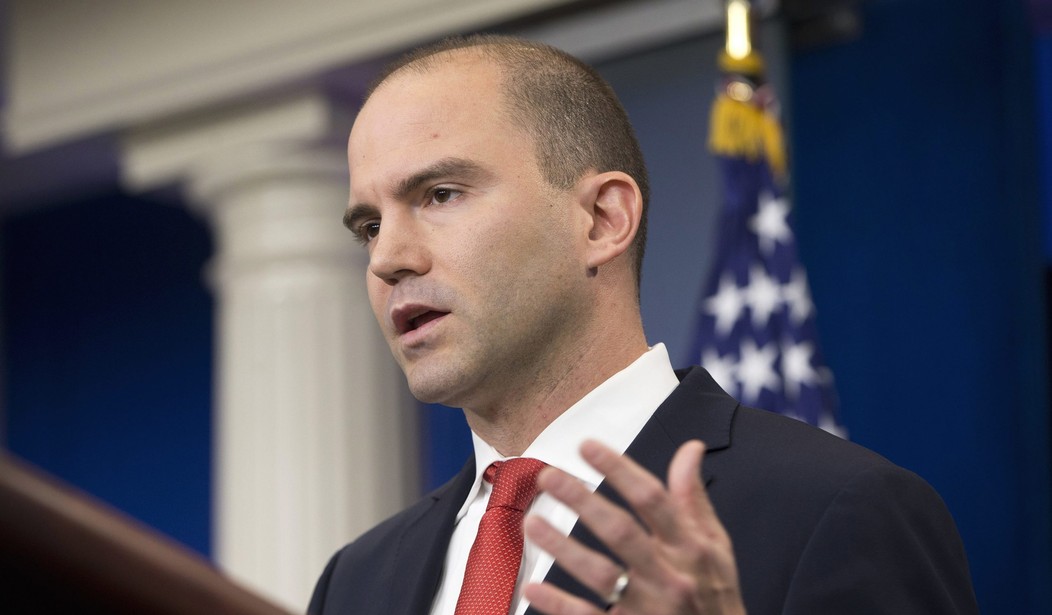In late 2008, the FBI almost denied President Obama’s most trusted national security adviser top-level security status, recently revealed emails show, and now some members of Congress are trying to find out why.
White House Deputy National Security Adviser Ben Rhodes is known for being the creative writing expert behind the demonstrably false Benghazi talking points used by then-UN Ambassador Susan Rice for a series of appearances on television Sunday news programs on Sept. 16, 2012.
A key proponent of the Obama administration’s diplomacy with Iran, Rhodes also led the administration’s efforts to mislead Congress about the terms of the Iran nuclear agreement, creating what he described as an “echo chamber” in the media.
Emails released on WikiLeaks as part of a hack on Clinton campaign chairman John Podesta confirm that Rhodes was not able to pass preliminary background checks by the FBI in October of 2008.
“We agree that it would not be worth pushing for Benjamin Rhodes to receive interim status,” Obama transition team member Cassandra Butts later wrote to Podesta. “For your information, out of the approximately 187 people who we have moved through the process Benjamin was the only person declined interim status,” the email said.
Now, according to the Washington Free Beacon, Rhodes is the focus of a congressional inquiry following these disclosures that the FBI may have denied him top-level security clearance during the interim period.
Lawmakers are now concerned that Rhodes’ access to the top levels of government—including its diplomacy with Iran—is inappropriate due to the FBI’s concerns about his past.
“Recent reports indicate the FBI denied, or was going to deny, Ben Rhodes an interim security clearance during President Obama’s transition,” Reps. Trent Franks (R., Ariz.) and Jim Bridenstine (R., Okla.) wrote in a recent letter to FBI Director James Comey, according to a copy obtained by the Free Beacon.
“This previously unknown fact is extremely troubling and calls into question the integrity of the FBI’s protocols and the wisdom of Mr. Rhodes’ continued government employment,” the lawmakers wrote.
Individuals can be denied security clearance for a number of reasons, including a criminal record, history of drug use, or “questionable foreign ties or relationships.”
The latter possibility is raising concerns among lawmakers and veteran foreign policy insiders who say that Rhodes’ history of promoting diplomacy with Iran may have been the reason for his disqualification.
The FBI reportedly completed its review into Rhodes after the transition and he was able to obtain all relevant security clearances related to his leading role in the Obama White House. The Washington Free Beacon’s source said Rhodes was granted full security clearance before Obama’s 2008 inauguration.
Congressmen Franks and Bridenstine expressed alarm, however, about Rhodes’ initial rejection and are seeking further information from the FBI about what exactly disqualified Rhodes.
“For the FBI to evidently find something in Mr. Rhodes’ background that led it to potentially deny him a security clearance only to have Mr. Rhodes work at the highest levels of the Obama administration shakes the entire clearance process to the core,” the lawmakers wrote. “Mr. Rhodes has working in the White House for the past seven years and is the architect of the Iran deal ‘echo chamber,’ as he recently described himself.”
“We can only hope the FBI was ultimately satisfied with its ability to investigate Mr. Rhodes and felt that it had sufficient freedom to decide whether or not to grant Mr. Rhodes a security clearance,” the letter states.
The members are asking the FBI to provide further information about the issues over Rhodes’ security clearance.
In a New York Times profile last May, Rhodes cited the Ploughshares Fund as a key surrogate responsible for creating his media “echo chamber,” which promoted the Iranian nuclear deal and shot down fact-based criticism of it.
In the New York Times Magazine article, Rhodes explained how the administration worked with nongovernmental organizations, proliferation experts and even friendly reporters to build support for the seven-nation accord that curtailed Iran’s nuclear activity and softened international financial penalties on Tehran.
“We created an echo chamber,” said Rhodes, a deputy national security adviser, adding that “outside groups like Ploughshares” helped carry out the administration’s message effectively.
A veteran foreign policy operative in D.C. who is familiar with the matter told the Beacon that the clearance issues “could be linked to Rhodes’ longtime efforts to promote U.S.-Iran diplomacy.”
“Everyone knows that the push for Iran engagement as far as the beltway elite are concerned began with the Iraq Study Group. Ben Rhodes wrote that report,” said the source, who requested anonymity to speak freely. “Who knows who whispered those ideas into his ear.”
The Capital Research Center’s Matthew Vadum explained how the White House managed to ram through the Iran nuclear treaty with the help of private foundations.










Join the conversation as a VIP Member